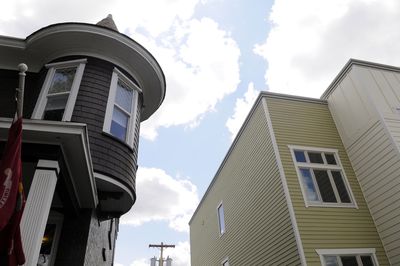Stimulus benefits housing for poor
Federal cash may ensure completion of affordable units

When Salem Lutheran Church in Spokane’s West Central neighborhood started looking at what really was the best use for land it owned behind and across the street from the church, the answer was simple: low-income housing.
That’s what already occupied some of the property, but only on a small scale, in older, converted homes.
“Now, instead of 14 units, there are 47 units, which will be a real blessing, we think, to the community and to these folks we’re serving,” said the Rev. Tom Soeldner, pastor at Salem Lutheran. Some of the former residents are moving back into the new units.
In a city that lost about 200 units of affordable housing in the past two years due to market-rate development, a combination of federal, state, local and private funds along with the work of numerous groups brought the Walnut Corners project together, in what Soeldner called “kind of a miracle story, as far as timing is concerned.”
But like affordable housing projects across the country, the project’s financing was threatened when the recession killed the market for low-income housing tax credits, which are the nation’s main funding method for low-income housing development. Now, federal economic stimulus money is rolling in to help bridge that gap, and Walnut Corners could be among the projects to benefit.
U.S. Housing and Urban Development Secretary Shaun Donovan last week released $2.25 billion in stimulus money to jump start as many as 1,000 stalled affordable housing projects across the nation. Washington got $43 million – nearly four times as much as was anticipated a month ago – and Idaho got $8.75 million.
“It’s significant funding,” said Bob Peterson, tax credit manager for the Washington Housing and Finance Commission. “Investment has dropped off in Washington state.”
Developers of low-income housing typically sell the federal tax credits to help finance their developments. But as the housing market dropped in the past two years, the value of the credits plummeted. Peterson said two years ago investors routinely paid 95 cents on the dollar for the credits; now it’s down to as low as 65 cents.
The economic stimulus money will come in the form of grants to close that gap; both the Idaho and Washington housing finance agencies are reviewing competitive applications for the money, with decisions due within the next one to two months.
Soeldner’s church joined with three others, plus Salem Arms, a nonprofit service provider for people with mental illness, in 2005 to form Spokane Urban Ministries and convert the property into a gracious new development, complete with spots for church-operated enterprises including a book salon, coffee shop, deli and grocery.
The Rev. James Kashork, president of Spokane Urban Ministries, said the project initially had promising offers for its tax credits, which it was awarded by the state housing finance agency. But he said, “By the time the market kind of sank, the offers weren’t feasible, just in terms of being able to pay off the construction loan and make the project work.”
Walnut Corners received a bridge loan through the Washington State Housing Trust Fund. That kept the project on track, and it’s nearly completed – a grand opening is scheduled for July 30. “If we receive the stimulus funds, then we’ll pay off the housing trust fund bridge loan,” Kashork said. “We’ll have to pay that off one way or the other.”
Lee Jones, spokesman for the U.S. Department of Housing and Urban Development in Seattle, said, “A lot of tax credit developments that have been expected to go forward have not been able to sell credits. … So we’re providing appropriated dollars to close the gap.”
To be eligible for the stimulus money, projects will have to be ready to go and be completed by Feb. 16, 2012.
Donovan, the HUD secretary, called the money “an important step in achieving the goal of putting American people back to work while at the same time providing quality, affordable housing options for low-income families at a time when it is needed more than ever.”
In addition to Salem Lutheran, the churches that formed Spokane Urban Ministries include Emmanuel and St. Paul Lutheran, which since have merged into All Saints Lutheran in Browne’s Addition, and Grace Lutheran Church in the East Central neighborhood.
Soeldner said, “We feel our work continues, not only in terms of providing a building, but building relationships and being of ongoing assistance to these folks. So it’s the beginning.”